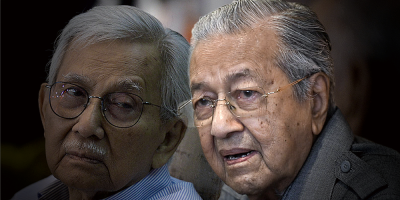
In an exclusive interview with the media recently, the former Minister of Finance of Malaysia, Daim Zainuddin, spoke candidly about the issue of civil servants and government-run enterprises.
What is admirable is that Daim not only analysed the many problems accumulated by bloated civil service and government-run enterprises, but also admitted the mistakes in which he also participated in the past, which sounded quite repentant in a way.
Daim’s confession and reflective remarks over his own past may be attributable to his new circle of friends after he quit the political arena, and has been in contact with them who are more socially conscientious and are not competing for government business interests.
Daim is one of the typical elites of successful Malay entrepreneurs that former Prime Minister Tun Abdul Razak intended to shape after the implementation of the New Economic Policy in the 1970s.
Daim came from a humble background, and his success was naturally due to the shelter and care of Umno which controls Barisan Nasional, especially the guidance and support of Harun who was the Selangor Menteri Besar in the 1970s, and Mahathir, who became the Prime Minister in the 1980s.
Nevertheless, Daim’s success has relied substantially on certain important factors such as his own personal talent and hard work in running business.
With such a background, Daim had the courage to speak out about the shortcomings of government-run enterprises in an exclusive interview with the media.
First of all, Daim pointed out that politicians should not create an abnormally bloated civil service system for the sake of votes with little regard of national interests.
An over-expanded civil service has indeed brought a huge economic burden and is very detrimental to the future development of the country.
Currently there are rumors that the government may implement a 4-day work week.
Daim opposed this 4-day week system although he did not give specific reasons.
But after a little thought, we can conclude that the 4-day system is completely unnecessary at this stage.
Considering the number of public holidays in the country, Malaysia should be ranked one of the top most in the world.
Given the current efficiency of civil servants, don’t you think the work of the 5-day system can be shortened to a 4-day week and yet maintain its present-day efficiency?
Besides, some Western European countries having adopted the 4-day system, have made a corresponding cut in the pay of their employees.
In Malaysia, however, can we cut the salaries of civil servants because of the 4-day system? Obviously, this is unlikely.
Back to the time when Daim served as Minister of Finance for seven years (1984-1991), and his approach and attitude towards government-run enterprises.
He admitted that he had approved a large number of government-linked companies whose key function was, in principle, to develop the national economy. But most of them suffered losses.
Many CEOs of government-linked companies earned as much as RM1 million a year, but they performed poorly as they did not take it seriously in their positions.
When problems arose, they would ask to be transferred to another government-linked company to take the helm and manage them with the same working attitude until their retirement!
We know very well that because government-owned enterprises are closely linked to party politics, there is no reward or punishment mechanism.
The CEOs would only be punished if they were on the wrong side during the ruling party’s top position fight.
However, judging from past cases, even if you are on the wrong team, you are welcome to change your mind and return to serve the winner of the party competition.
This is seen to be quite normal in Malay politics which is characterized by tolerance and magnanimity, and we should not be surprised by “jumping frogs” around.
Again in his exclusive interview, Daim mentioned that state-owned companies should not compete with private companies for the same business.
We very much agree with his view because state-owned enterprises have political advantages, making it difficult for private enterprises to compete with them on an equal footing.
Yet state-owned companies might not be able to complete the project at a relatively low cost or with quality assurance.
After half a century of development, the total market capitalization of state-owned enterprises has reached RM445 billion, accounting for 25% of the total of Bursa Malaysia, while Khazanah alone accounts for 14% of it.
In the end, Daim suggested good civil servants should leave and conduct business in the private sector, which is an issue all Malaysians are concerned about.
Indeed, if enterprising and motivated Malay civil servants are willing to join the private sector, the government not only can cut down expenses but also bring a little more racial harmony to the whole society.
In doing so, Malay radical critics can no longer blame the ethnic Chinese for having a monopoly in private retail businesses.
In this sense, we will be happy to see that more skilled workers are Malays who serve the entire car maintenance business together with their Chinese counterparts.
With a fair and positive competition in this industry, all consumers will benefit as they will receive higher quality services.
(Wong Tai-Chee has his B.A and M.A degrees in Urban and Regional Planning from the University of Paris, and earned his PhD in Human Geography from the Australian National University. After teaching 20 years in Nanyang Technological University, Singapore, he retired in 2013. He then worked as Distinguished Professor for two years at Guizhou University of Finance and Economics, China, and as Dean and Professor at the Southern University College, Johor until the end of 2018. He was Visiting Professor to University of Paris (Sorbonne IV), Visiting Fellow to Pekin University, Tokyo University and University of Western Australia. His main research interests are in urban and economic issues, and more recently on Malaysian politics. Besides his 15 self-authored and edited book volumes, he has written over 100 academic articles and published widely in international journals.)
ADVERTISEMENT
ADVERTISEMENT








































